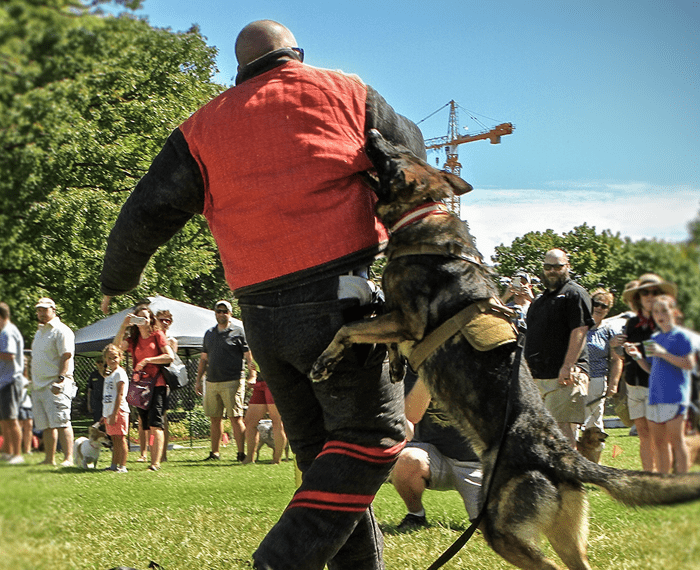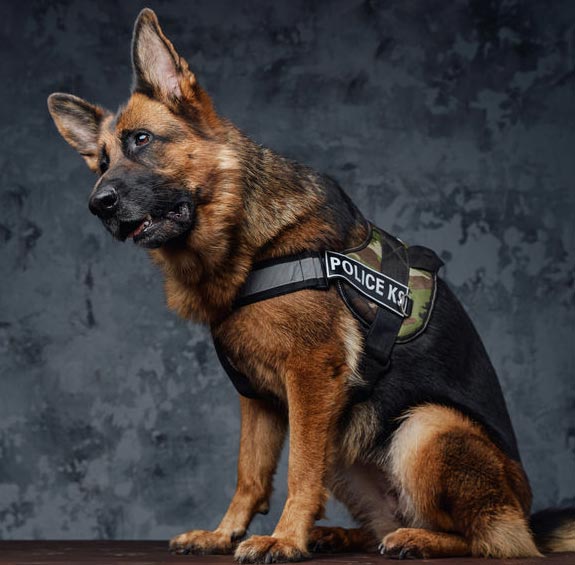Last Updated on September 24, 2025 by Emily Hartman
Ever marveled at the remarkable skills of K9 dogs and wondered how they become so adept at their tasks? You’re not alone.
The journey these dogs undergo is nothing short of fascinating, and it might just change the way you perceive our canine companions. Imagine having the ability to understand the secrets behind their training, unlocking insights into their specialized world. Whether you’re a dog lover or simply curious about the incredible capabilities of these four-legged heroes, discovering how K9 dogs are trained is an adventure you won’t want to miss.
Get ready to dive deep into a world where dedication meets intelligence, and where the bond between humans and dogs reaches extraordinary heights.
Contents
Foundations Of K9 Training
The training of K9 dogs is a detailed process that requires patience and expertise. These canine heroes are crucial in law enforcement and security tasks. Their journey from playful pups to disciplined professionals begins with solid foundations. Understanding these basics is key to appreciating their specialized skills.
Understanding Canine Behavior
Training starts with understanding the dog’s instincts. Trainers focus on natural behaviors. These include sniffing, retrieving, and guarding. Recognizing these instincts helps in guiding the training process effectively.
Building Trust And Bond
A strong bond is essential for successful training. Trainers spend time with the dogs daily. This helps in building trust. Consistent interaction ensures the dogs feel secure and loyal. This bond is the backbone of all training efforts.
Obedience Training
Obedience is the first step in K9 training. Dogs learn basic commands like sit, stay, and come. Consistent practice is crucial for mastering these commands. Rewards and praise reinforce positive behavior.
Socialization Skills
K9 dogs must interact well with humans and other animals. Socialization training helps them remain calm in different situations. Exposure to various environments is part of this training. It ensures they are adaptable and confident.
Physical Conditioning
Physical fitness is vital for K9 dogs. Regular exercise keeps them healthy and energetic. Activities like running and swimming are included in their routine. This conditioning prepares them for demanding tasks.
Problem-solving Exercises
Problem-solving is crucial in advanced training. Dogs face challenges to enhance their thinking skills. These exercises improve their ability to make quick decisions. It prepares them for real-world scenarios.
These foundational aspects lay the groundwork for specialized training. They ensure K9 dogs are well-prepared for their roles. Each step is carefully planned to match the dog’s abilities. This approach guarantees success in their diverse duties.

Credit: nashvillek9.com
Specialized Skills Development
Specialized skills development is crucial in training K9 dogs. Each K9 dog undergoes rigorous training to master specific tasks. These skills are essential for their roles in law enforcement, search and rescue, or detection.
Tracking And Scent Detection
K9 dogs excel in tracking and scent detection. Trainers use scent trails to teach dogs to locate missing persons or criminals. Dogs learn to differentiate between various scents. This makes them invaluable in search and rescue missions.
Obedience And Control
Obedience is the foundation of K9 training. Trainers emphasize commands such as sit, stay, and fetch. The ability to follow commands ensures the dog’s reliability in the field. Control training helps dogs remain calm in stressful situations.
Search And Rescue Operations
Search and rescue skills are vital for K9 dogs. Trainers simulate disaster scenarios for effective training. Dogs learn to navigate rubble and debris. This prepares them for real-life rescue missions.
Protection And Apprehension
Protection skills are crucial for police K9 units. Dogs are trained to apprehend suspects safely. This involves bite training with protective gear. The focus is on control and restraint during apprehension.
Agility And Physical Conditioning
Agility training enhances a dog’s physical capabilities. Courses with obstacles improve a dog’s speed and coordination. Physical conditioning ensures dogs are fit for demanding tasks. This training boosts their endurance and performance.
Ongoing Training And Evaluation
Ongoing training and evaluation are crucial for K9 dogs. These dedicated animals require consistent practice to maintain their skills. Regular assessments ensure they perform effectively in real situations. Handlers and trainers work closely with the dogs. This partnership fosters a strong bond and understanding. Their efforts ensure the dogs meet high standards of performance.
Training Drills And Exercises
K9 dogs engage in various drills to enhance their abilities. These exercises are designed to test their agility and responsiveness. Trainers use real-life scenarios to simulate challenges the dogs may face. Each session aims to improve specific skills. This structured approach ensures the dogs stay sharp and prepared.
Behavioral Assessments
Evaluating behavior is a key aspect of ongoing training. Trainers assess the dogs’ reactions to different stimuli. This helps identify areas needing improvement. Behavioral assessments ensure the dogs remain calm and focused under pressure. It is vital for their role in law enforcement and search missions.
Physical Fitness Checks
Physical fitness is essential for K9 dogs. Regular checks monitor their health and endurance levels. These checks include assessing muscle strength and cardiovascular health. Maintaining physical fitness ensures the dogs can perform demanding tasks. Trainers prioritize these checks to keep the dogs in top condition.
Feedback And Adjustments
Feedback is crucial for continuous improvement. Trainers review the dogs’ performance and provide constructive feedback. Adjustments to training programs are made based on this feedback. This process helps refine the dogs’ skills. It ensures they are always ready for any challenge.

Credit: www.dogtrainercollege.us

Credit: en.wikipedia.org
Frequently Asked Questions
How Do K9 Dogs Learn Basic Commands?
K9 dogs learn basic commands through repetition and positive reinforcement. Trainers use rewards like treats or toys.
What Skills Do K9 Dogs Develop During Training?
K9 dogs develop skills like obedience, scent detection, and agility. They also learn to work with handlers.
How Long Does K9 Training Typically Take?
K9 training usually takes several months. It depends on the dog’s abilities and the specific skills required.
Why Is Socialization Important For K9 Dogs?
Socialization helps K9 dogs remain calm in public. It prepares them to handle different environments and people.
Conclusion
Training K9 dogs involves dedication and skill. These dogs learn to follow commands. They develop strong bonds with their handlers. They become experts in tracking and protection. Trainers use positive reinforcement methods. This ensures effective learning. K9 training requires patience and consistency.
Dogs learn through practice and repetition. Skilled trainers understand each dog’s unique needs. Training is both challenging and rewarding. K9 dogs play vital roles in law enforcement. Their abilities help keep communities safe. Understanding their training gives insight into their amazing capabilities.
K9 dogs are true heroes, serving with loyalty and courage.

Emily Hartman is a lifelong dog lover, writer, and canine care enthusiast. With years of experience in pet parenting and a deep passion for helping others raise happy, healthy dogs, she shares practical tips, thoughtful advice, and product recommendations to make life better for pups and their people. When she’s not writing, you’ll find her hiking with her rescue lab, Milo, or exploring new dog-friendly spots around town.

